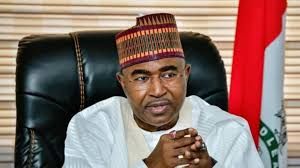The meeting between Brigadier General Mohamed Buba Marwa (retd.), Chairman/Chief Executive Officer of the National Drug Law Enforcement Agency (NDLEA), and Mr. Cheikh Ousmane Toure, the new UNODC Country Representative in Nigeria, signifies a crucial step towards strengthening the collaborative efforts in combating drug abuse and illicit trafficking within Nigeria and the broader West African region. Marwa’s appeal for increased UNODC support underscores the NDLEA’s recognition of the multifaceted nature of the drug challenge and the need for robust partnerships to effectively address it. The discussions centered around key areas requiring immediate attention, including updated drug use surveys, alternative development programs for cannabis growers, enhanced workforce training, and the provision of portable drug test kits. These specific requests reflect a strategic approach aimed at enhancing data-driven decision-making, providing sustainable livelihood alternatives, bolstering operational capacity, and improving field-level detection capabilities.
The call for an updated drug use survey highlights the NDLEA’s commitment to evidence-based policymaking. Recognizing that the drug landscape is constantly evolving, Marwa emphasized the importance of fresh data to accurately assess current prevalence rates, identify emerging trends, and understand the shifting dynamics of drug abuse. The last comprehensive survey conducted in 2018, while valuable, no longer provides a completely accurate reflection of the current situation. An updated survey will furnish critical insights to inform the development of targeted interventions and the formulation of a new National Drug Control Master Plan (NDCMP) to replace the expiring 2021-2025 framework. This data-driven approach ensures that Nigeria’s drug control strategies remain relevant and effective in addressing the evolving challenges.
Marwa’s emphasis on alternative development programs for cannabis growers reflects a proactive and humane approach to drug control. Recognizing the socio-economic factors that often drive individuals into illicit crop cultivation, the NDLEA is pioneering an initiative in Africa aimed at providing sustainable livelihood alternatives. By transitioning cannabis farmers to legal and economically viable agricultural practices, the program seeks to address the root causes of illicit cultivation while simultaneously improving the lives of those involved. This innovative approach not only disrupts the supply chain of illicit cannabis but also contributes to community development and economic empowerment. The success of this program could serve as a model for other African nations grappling with similar challenges.
Strengthening the NDLEA’s workforce capabilities is another crucial aspect of Marwa’s request for increased UNODC support. Recognizing that the effectiveness of any organization hinges on the skills and expertise of its personnel, he emphasized the need for enhanced training programs and the development of master trainers. These initiatives aim to equip NDLEA operatives with the necessary knowledge, skills, and tools to effectively combat drug trafficking and address the complexities of drug abuse. By investing in its human capital, the NDLEA seeks to enhance its operational efficiency and strengthen its capacity to respond to the evolving drug landscape. This commitment to ongoing professional development ensures that the agency remains at the forefront of drug control efforts.
The request for portable drug test kits highlights the importance of equipping NDLEA operatives with the tools they need to perform their duties effectively in the field. These kits will enable officers to conduct on-the-spot substance identification, enhancing their ability to detect and intercept illicit drugs. This rapid and accurate identification capability is crucial for disrupting drug trafficking networks and enforcing drug laws. By providing these essential tools, the UNODC can significantly contribute to the NDLEA’s operational effectiveness and its ability to combat drug trafficking on the ground. This enhanced field capability will contribute to more successful interdictions and strengthen the overall drug control efforts.
Mr. Toure’s response reaffirms the UNODC’s commitment to deepening its collaboration with the NDLEA. Recognizing the agency’s leadership role in Africa’s drug enforcement efforts, he expressed willingness to work with Nigeria in extending its successful initiatives to the state level. This commitment to collaboration signifies a shared understanding of the transnational nature of the drug problem and the need for coordinated efforts across borders and within different levels of government. By working together, the NDLEA and UNODC can leverage their respective strengths and expertise to maximize their impact on the drug problem. This partnership approach is essential for achieving sustainable progress in the fight against drug abuse and illicit trafficking.
The acknowledgement that drug abuse contributes significantly to security challenges across the region further underscores the need for a comprehensive and collaborative approach. By addressing the drug problem, stakeholders can contribute to broader security and stability. The commitment of both the NDLEA and UNODC to work together represents a crucial step towards achieving this goal. This partnership, bolstered by increased support in the identified key areas, holds the potential to significantly impact the fight against drug abuse and trafficking in Nigeria and the wider West African region. The ongoing collaboration and shared commitment to addressing this complex issue are vital for achieving lasting positive change and improving the security and well-being of communities affected by drug abuse.














